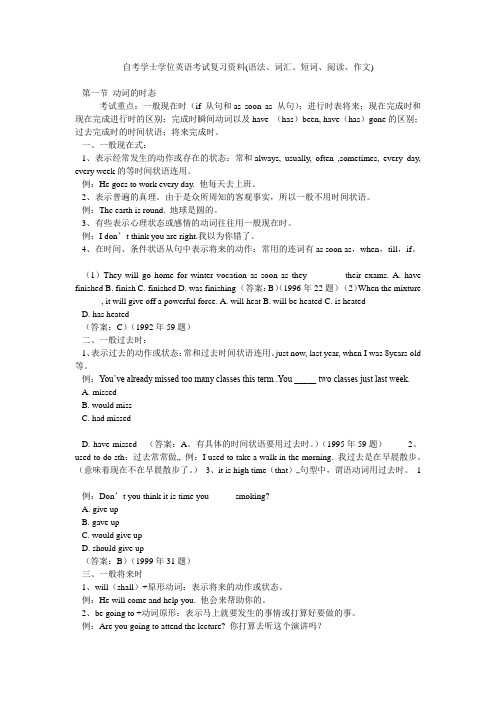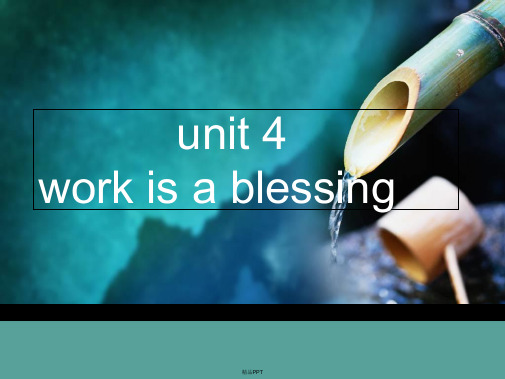自考英语语法讲义及练习
自考英语(下)讲义和课后答案

目录Unit 1 (1)Unit 2 (4)Unit 3 (7)Unit 4 (10)Unit 5 (13)Unit 6 (16)Unit 7 (18)Unit 8 (21)Unit 9 (24)Unit 10 (26)Unit 11 (29)Unit 12 (32)Unit 13 (36)Unit 14 (40)Unit 15 (43)Unit 1第一部分 Text A【课文译文】什么是决策决策是从可供挑选的行动方案中作出选择,目的在于确定并实现组织机构的目标或目的。
之所以要决策是因为存在问题,或是目标或目的不对,或某种东西妨碍目标或目的实现。
因此,决策过程对于管理人员非常重要。
管理者所做的一切几乎都与决策有关,事实上,有人甚至认为管理过程就是决策过程。
虽然决策者不能预测未来,但他们的许多决策要求他们必须考虑未来可能会发生的情况。
管理者必须对未来的事情作出最佳的猜测,并使偶然性尽可能少地发生。
但因为总是存在着未知情况,所以决策往往伴随着风险。
有时失误的决策带来的后果不很严重,但有时就会不堪设想。
选择就是从多种选项中进行取舍,没有选择,就没有决策。
决策本身就是一个选择的过程,许多决策有着很广的选择范围。
例如,学生为了实现自己获得学位的目标,可能会从多门课程中进行选择,对于管理者来说,每一个决策都受到政策、程序、法律、惯例等方面的制约,这些制约存在于一个组织的各个部门里。
选项就是可供选择的种种可行的行动方案。
没有选项,就没有选择,因而也就没有决策。
如果看不到任何选项,这意味着还没有对问题进行彻底的研究。
例如,管理者有时会用“非此即彼”的方式处理问题,这是他们简化问题的方法。
这种简化问题的习惯常常使他们看不到其他的选项。
在管理这个层次上,制定决策包括:识别选项和缩小选项范围,其范围小到微乎其微,大到近乎无限。
决策者必须有某种方法来断定几种选项中的最佳选项,即哪个选项最有利于实现其组织的目标。
组织的目标是指该组织努力完成或达到的目标或现状。
自考《英语二》讲义

自考《英语二》讲义自考“英语(二)”完整讲义讲义一T ext A What Is a Decision ?I.课文内容简介决策的目的是制定和实现组织目标。
作决策的原因是有问题存在、目标和目的不正确、或者有某种东西防碍目标或目的的实现。
作决策的过程对管理人员来说至关重要。
决策者必须具备从多个可供选择的可能性中确定最佳选择的手段。
而多种目标的顺序和重要性也部分地基于决策者的价值观。
今天所作的决策可能会对将来产生深远的影响。
因此,有经验的管理者能从当前决策看到将来的效果。
II.New WordsOrganizational a. 组织上的goal n. 目的,目标objective n./ a. 目标,目的/客观的,真实的Accomplish vt. 完成(任务等)predict vt./vi. 预言;预示accompany vt. 伴随,陪同Implement vt. 实现;完成Constraint n. 强制;强制因素precedent n. 先例,前例Simplify vt. 简化tendency n. 趋势,倾向Managerial a. 经理的,管理人的maker n. 制造者;制造商Achievement n. 完成,达到attain vt. 达到;完成optimal a. 最适宜的,最理想的suboptimization n. 局部最优化trade-off n. 权衡;物物交换argue vt./vi. 争辩,争论budget n./vt. 预算scheme n./vt.把… 编入预算define vt. 解释,给…下定义Multiple a./n.多样的,复合的/倍数Profitability n. 赚钱,获利correctness n. 正确,正确性unintended a. 非计划中的,非故意的ongoing a. 进行中的,非故意的entity n. 存在,实体Skilled a. 熟练的;有技能的in the way 挡路、碍事to make a guess at 猜测and the like 等等,诸如此类to seek to 追求,争取in part 部分地,在某种程度上point of view 观点词汇精讲1.goal n. 目标,进球,球门(同义词:aim ,end ,purpose,objective)Her goal is a place at university . 她的目标是在大学任教。
英语语法讲解及练习大全(附答案)

Contents第一部分语法讲解第一讲词类、句子成分、构词法 (3)第二讲名词 (4)第三讲代词 (6)第四讲数词 (9)第五讲冠词 (10)第六讲形容词和副词 (12)第七讲介词 (19)第八讲动词(一)动词概述 (21)第九讲动词(二)动词时态和语态 (25)第十讲动词(三)非谓语动词及动词辨析 (29)第十一讲连词 (35)第十二讲简单句 (36)第十三讲句子成分 (39)第十四讲简单句句式 (42)第十五讲并列句和主从复合句 (43)第二部分巩固与提高测评测评一名词 (47)测评二代词 (48)测评三数词 (51)测评四冠词 (52)测评五形容词和副词 (54)测评六介词 (58)测评七动词 (60)测评八连词 (69)测评九句子 (70)测评十交际用语 (75)第三部分语法网络图第一讲:词类、句子成分和构词法:2、代词(pron.):主要用来代替名词。
如:who, she, you, it .3、形容词(adj..):表示人或事物的性质或特征。
如:good, right, white, orange .4、数词(num.):表示数目或事物的顺序。
如:one, two, three, first, second, third, fourth.5、动词(v.):表示动作或状态。
如:am, is,are,have,see .6、副词(adv.):修饰动词、形容词或其他副词,说明时间、地点、程度等。
如:now, very, here, often, quietly, slowly.7、冠词(art..):用在名词前,帮助说明名词。
如:a, an, the.8、介词(prep.):表示它后面的名词或代词与其他句子成分的关系。
如in, on, from, above, behind.9、连词(conj.):用来连接词、短语或句子。
如and, but, before .10、感叹词(interj..)表示喜、怒、哀、乐等感情。
自考学士学位英语考试复习资料(语法词汇短词阅读作文)

自考学士学位英语考试复习资料(语法、词汇、短词、阅读、作文)第一节动词的时态考试重点:一般现在时(if 从句和as soon as 从句);进行时表将来;现在完成时和现在完成进行时的区别;完成时瞬间动词以及have (has)been, have(has)gone的区别;过去完成时的时间状语;将来完成时。
一、一般现在式:1、表示经常发生的动作或存在的状态:常和always, usually, often ,sometimes, every day, every week的等时间状语连用。
例:He goes to work every day. 他每天去上班。
2、表示普遍的真理。
由于是众所周知的客观事实,所以一般不用时间状语。
例:The earth is round. 地球是圆的。
3、有些表示心理状态或感情的动词往往用一般现在时。
例:I don’t think you are right.我以为你错了。
4、在时间、条件状语从句中表示将来的动作:常用的连词有as soon as,when,till,if。
(1)They will go home for winter vocation as soon as they ________their exams. A. have finished B. finish C. finished D. was finishing (答案:B)(1996年22题)(2)When the mixture ______, it will give off a powerful force. A. will heat B. will be heated C. is heatedD. has heated(答案:C)(1992年59题)二、一般过去时:1、表示过去的动作或状态:常和过去时间状语连用。
just now, last year, when I was 8years old 等。
自考“英语(二)”完整讲义(124)

3.of…importance 有…重要性 4.in the strict sense 在严格的意义上 They are not immigrants, at least not in the strict sense. 从严格意义上来说他们不是移民。
5.of…interest 有…兴趣 6.to coincide with 相符,⼀致 7.attitude towards 对…的态度;意见 What is your attitude to/towards this idea?你对这个想法的态度如何? 8.at a guess 凭猜测 9.to go in for 参加,从事;以…为兴趣,爱好 compel devide get rid of What sports do you go in for?你喜欢什么运动? He goes in for pop music. 他喜欢流⾏⾳乐。
The boy goes in for stamp collecting. 这个男孩喜欢集邮。
10.to get one's teeth into 死死咬住,紧紧抓住;认真对待 Work, Labor, and Play So far as I know, Miss Hannah Arendt was the first person to define the essential difference between work and labor. To be happy, a man must feel, firstly, free and, secondly, important. He cannot be really happy if he is compelled by society to do what he does not enjoy doing, or if what he enjoys doing is ignored by society as of no value or importance.(1)In a society where slavery in the strict sense has been abolished, the sign that what a man does is of social value is that he is paid money to do it, but a laborer today can rightly be called a wage slave.(2)A man is a laborer if the job society offers him is of no interest to himself but he is compelled to take it by the necessity of earning a living and supporting his family.(3) 1.本句中,as of no value or importance 在if 从句中作主语补⾜语, as 在这⾥是介词,解释为“作为…”“be ignored by society as …”被社会作为毫⽆价值或⽆关紧要的东西⽽忽视。
自考英语(二)课文语法讲解unit 4 work is a blessing

精品PPT
主语+should, would might, could+动词 原形
eg:If I had time, I would attend the meeting. If he had hurried ,he could have caught the train. If I were to go abroad ,I would go to America.
精品PPT
New words
look forward to
期望,盼望;瞩望 I look forward to hearing from you in the near future. 我盼望着不久收到你的信。有些人可 能会说这事实上算不上什么负担,她应该想想自己有多幸运。 They look forward to their rebirth as a nation. 他们期待着全民族的新生。 We look forward to seeing you again. 我们期待着与你再次相见。 Every year people look forward to the day with great eagerness. 每年人们都急切地盼望那 一天。 look into 在…里查资料;深入地检查;调查;观察 The government will look into how to reduce unemployment. 政府将研究如何降低失业率。 He chooses to look into the matter till the truth is out. 他决定调查那件事直至真相大白。 look out 向外看; 面向; 朝外;当心 Look out for symptoms of depression. 留心看有无(yǒu wú)抑郁症状。 look for 寻找(某人或某物);<口>找(麻烦);找(苦头)吃;希望得到
自考英语(一)重点语法复习(全)

一.名词不可数名词量的表示语:(1) 不可数名词可加表单位的形容片语,表示数的观念。
其公式为:数词+单位词+of+不可数名词(2) 各类表单位的形容词片语。
(A) 物质名词:a piece (suit) of armour a piece (slice) of cake a piece (an article) of furniture a piece of jewelrya piece (sheet) of paper a cake of soap a piece (slice) of bacon a piece (stick) of chalka bit (blade) of grass a piece (strip) of land a bit (grain) of rice a bowl of soup(B) 抽象名词 a word of abuse an item (a bit) of business an attack of fever a bit (an amount) of interest;a fit of passion a piece (word) of advice a piece of evidence a piece (an item) of information a piece (an item) of news;(C) 自然现象:a flash of lightening; a bolt of thunder;名词种类的表示语:kind of, sort of, type of, 三者都可接可数名词及不可数名词,其后的冠词a (an)常被省略。
之前可加a, the, some, any, etc.What kind of (a) pencil did you buy?I had a kind of suspicion that he was cheating.I like this kind of flower.I like flowers of this kind. (置名词后更强调种类)II. 名词的数:III. 名词的所有格:名词在句中表示所有关系的语法形式叫做名词所有格。
自考英语一讲义(打印版)

Unit 1Text A How to Be a Successful Language Learner?搭配:1. disagree with 不同意/动词词组2. guarantee sth. for sb. 保证某人某事/动词词组e.g. This will not guarantee success for every adult language learner. 这样不能确保每一位学习语言的成年人都成功。
3. be different from 与什么不同/形容词词组4. succeed in sth./ doing sth. 成功做某事/动词词组5. offer advice to sb. 给某人建议/动词词组6. play with sth. 轻松学习某事物/动词词组7. in many ways 再很多方面/介词词组8. depend on sb./sth. for sth. 依靠某人或某事而获得某事/动词词组9. discover one‘‘s own way to do sth. 发现并用自己的方法做某事/动词词组10. instead of sth./ doing sth. 想反/而没有做某事/介词词组11. wait for sb. to do sth. 等待某人做某事/动词词组12. look for sth./sb. 寻找某人或某物/动词词组13. make a mistake 犯错误/动词词组14. be afraid to do sth. 害怕做某事/形容词词组15. be willing to do sth. 愿意做某事/形容词词组16. do sth. with a purpose 有目的地做某事/故意做某事/动词词组17. be interested in sth./sb. 对某人或某物很感兴趣/形容词词组18. communicate with sb. 与某人交流/动词词组19. learn from sb. 想某人学习20. might do well to do sth. 最好做某事句型:1. S.+V.+it+adj.+to do sth. 形式宾语句型 n.e.g. Some people find it difficult to succeed in language learning.Some people find it difficult to succeed in other fields.They find it easy to practice using the language regularly.2. It is +adj.+for sb.+to do sth. 形式主语句型e.g. It is more important for them to learn to think in the language than to know the meaning of every word.It is necessary for them to learn the language in order to communicate with these people and to learn for them.语言点:1. success(n.)-successful(adj.)-succeed(v.)成功2. hundreds of people与 eight hundred people:请注意有数词存在后,表量名词的变化。
- 1、下载文档前请自行甄别文档内容的完整性,平台不提供额外的编辑、内容补充、找答案等附加服务。
- 2、"仅部分预览"的文档,不可在线预览部分如存在完整性等问题,可反馈申请退款(可完整预览的文档不适用该条件!)。
- 3、如文档侵犯您的权益,请联系客服反馈,我们会尽快为您处理(人工客服工作时间:9:00-18:30)。
自考英语语法讲义及练习主讲人:胥国红主要内容:1.动词时态和语态2.非谓语动词3.虚拟语气4.定语从句和名词性从句1.动词的时态和语态1.1 动词的时态和语态一览表时态语态一般现在时一般过去时一般将来时主动被动doare donedidwere donewill dowill be done 现在进行时过去进行时将来进行时主动被动are doingare being donewere doingwere being donewill be doing 现在完成时过去完成时将来完成时主动被动have donehave been donehad donehad been donewill have donewill have been done 现在完成进行时主动被动have been doing1.2 动词主要时态的意义及运用1) 现在完成时,过去完成时和将来完成时英语提示语:up to now, so far, for three years, since 1995, over past ten years, by the end of this week, by the year of 1995汉语提示语:已经,早已,了e.g. We haven’t met each other since last year.By the end of this week, we’ll have finished the task.2)现在完成进行时从过去一直持续到现在,没有间断。
汉语提示语:一直e.g. The water has been running the whole night.3) 过去完成时a)said, reported, thought 等引导的间接引语中。
e.g. He missed the train. He said he had missed the train.b) hardly…when, no sooner… thane.g. No sooner had he got up than he received the call.c) 与过去事实相反的虚拟语气的条件状语从句中e.g. If I had tried harder, I would have won.I wish I had done better in the exam.历年考题中的动词时态和语态1. Much of the carbon in the earth ___ (come) from things that once lived.2.In the past two decades, research ___ (expand) our knowledge about sleep and dream.3.Some proverbs ___ (be) in the language for 1,000 years, for example, A friend in need is a friendindeed.4.___ (stand) at the gate was a young man in green coat.5.In 1991, after the Gulf War, Bush’s approved rating reached 91 percent, the highest level recordedsince polling ___ (begin) in the 19302.6.Seeing violence on television or reading about it in the newspapers every day ___ (make) ustolerate crime more than we should.7.So far, Irving ___ (live) in New York City for ten years.8.The patient ___ (send) to another hospital before we got there.9.The second half of the nineteenth century ___ (witness) the first extended translation into Englishof the writings of Eliphas Levi.10.All the worries they might have felt for him ___ (drive) off by the sight of his cheerful face.2. 非谓语动词2.1 动词主要时态和语态一览表非谓语动词形式意义现在分词一般式Doing 主动, 正在进行被动式being done 被动, 正在进行完成主动式having done 主动, 已经完成完成被动式having been done被动, 已经完成过去分词Done 被动, 已经完成动词不定式一般式to do主动,将要进行被动式to be done 被动, 将要进行完成主动式to have done 主动, 已经完成进行主动式to be doing 主动, 正在进行2.2. 非谓语动词作状语•动词不定式:1)目的状语;2)结果状语e.g. I came here to meet you. (目的)He hurried to the rail station only to miss the train. (结果)•分词:1) 伴随状语;2)原因状语;3)条件状语4)让步状语;5)时间状语e.g. Walking along the street, he met his old friend. (时间)Being very tired, my father didn’t go out with us. (原因)Made by hand, the silk shirt is very expensive. (原因)Seen from the space, the earth looks like a blue ball. (条件)2.3 非谓语动词,状语从句和独立结构1) Having done their homework, the children began to play. (分词作状语)2)After having done their homework, the children began to play. (连词+分词)3)After they had done their homework, the children began to play. (状语从句)4)With homework done, the children began to play. (独立结构)2.4 非谓语动词作定语1) If there is no choice, there is no decision ___ (make). (to be made)2)Do you know the man ____ ( stand) in front of the house? (standing)3)The question ____ (discuss) at the moment is very important. (being discussed)4)The bridge ____ (build) in the 1950s is still in good condition. (built)2.5 动名词和动词不定式*作主语和表语动名词作主语/表语表示一般、抽象的情况;动词不定时作主语表示具体某次的情况。
e.g Rising early is good for health.To rise early tomorrow is difficult for me.It is difficult for me to rise early tomorrow.My biggest wish is to go abroad.Seeing is believing.*作宾语接动名词作宾语的动词:admit, acknowledge, avoid, appreciate, consider, delay, enjoy, escape, excuse, forgive, finish, include, involve, mind, put off, postpone, suggest, feel like, look forward to, be used to, be accustomed to, etc.接动词不定式作宾语的动词:want, tend, intend, pretend, hope, plan, expect, be supposed to, seem, be likely to, used to, be willing to, desire, force, prefer, start, begin接动名词和动词不定式有不同含义的动词:5)forget, remember, regret6)stop, continue7)need/ want8)allow doing/ allow sb to do1) How can I forget meeting you for the first time?Sorry, I forgot to lock the door.2) I can’t stop laughing. Can you stop to give me a hand?3)The grass needs cutting. The grass needs to be cut.4)We don’t allow smoking here. You a re not allowed to smoke here.历年考题中的非谓语动词1. A man cannot be really happy if what he enjoys ___ (do) is ignored by society as of no value orimportance.2.Anyone ___(want) to understand the industry of the future will have to know about robotics.3.It is a well-known fact that a person will move in a circle when he cannot use his eyes ___ (control)his direction.4.As research techniques become more advanced, the number of animals ___ (use) in experimentsmay decrease.5. It seems reasonable to assume that, other things ___ (be) equal, they would prefer single to sharedrooms.6. This poem, if ___ (translate) word for word into Chinese, will make no sense.7. They may have their passports _____ (remove), making leaving or “escaping” actually impossible.8.Her body, with hands and feet ____ (bind), was discovered by a traveler early in the morning.9.I couldn’t help but ___ (feel) this is a very strange life.10.Let us consider the earth as a planet ____ (revolve) round the sun.Key:1. doing 动名词做enjoy的宾语2. wanting 现在分词作定语3. to control 动词不定式作目的状语4. used 过去分词作定语5. being 现在分词用在独立结构中6. translated 连词加过去分词作状语7. removed 过去分词作宾补8. bound 过去分词用在独立结构中9. feel couldn’t help but 后接动词原形10. revolving 现在分词作定语3. 虚拟语气第一大类:非真实条件下的虚拟语气时间从句主句与现在事实相反did/ were should/could/would + do与过去事实相反had done should/could/would + have doneshould/could/would + do与将来事实相反were to doshould doe.g. If I were you, I would be happy to do it.If we had got the news, we could have prepared earlier.If the job were to succeed, you should work harder.第二大类:从句中用过去时或过去完成时的虚拟语气1)would rather + 从句2)wish + 从句3)if only + 从句4)as if/ as though + 从句5)It’s time + 从句e.g. I would rather you didn’t tell me the story now.I would rather you had told me the story yesterday.第三大类:从句中用should加动词原形的虚拟语气,其中should可省略。
